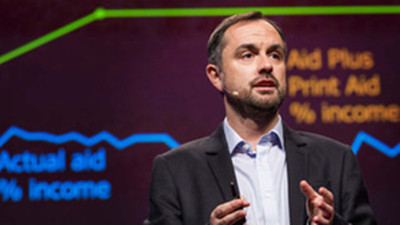Thirteen years ago,we set ourselves a goal to end poverty.
十三年前,我們?cè)O(shè)了一個(gè)目標(biāo), 結(jié)束貧困。
After some success,we've hit a big hurdle.
在取得一些小成功后,我們遇到了瓶頸。
The aftermath of the financial crisis has begun to hit aid payments,which have fallen for two consecutive years.
財(cái)政危機(jī)的后果開始沖擊救助款項(xiàng),而且連續(xù)兩年都在減少。
My question is whether the lessons learned from saving the financial system can be used to help us overcome that hurdle and help millions.
我的問題就是, 從挽救財(cái)政系統(tǒng)中得到的這些教訓(xùn)能否用來幫助我們克服這瓶頸,也幫助數(shù)以百萬的人民。
Can we simply print money for aid?
我們是否能直接印鈔以提供救助呢?
Surely not.
當(dāng)然不可以。
It's a common reaction.
這是人們正常的反應(yīng)
It's a quick talk.
這是一個(gè)短對(duì)話。
Others channel John McEnroe.
人們和約翰?麥肯羅的對(duì)話。
You cannot be serious!
你開玩笑的吧!
Now, I can't do the accent, but I am serious,thanks to these two children,who, as you'll learn, are very much at the heart of my talk.
我沒辦法模仿他的口音, 但我是認(rèn)真的,多虧了這兩個(gè)孩子,等下你們就會(huì)知道, 他們是我這個(gè)演講的中心。
On the left, we have Pia.
左邊這個(gè)女孩,名叫皮婭。
She lives in England.
她住在英格蘭。

She has two loving parents,one of whom is standing right here.
她的雙親都很和藹可親,其中一個(gè),就站在這里。
Dorothy, on the right,lives in rural Kenya.
桃樂茜,右邊的孩子,住在肯尼亞農(nóng)村。
She's one of 13,000 orphans and vulnerable children who are assisted by a charity that I support.
她是一萬三千孤兒和弱勢(shì)兒童中的一員,她在接受我所資助的 一個(gè)慈善機(jī)構(gòu)的幫助。
I do that because I believe that Dorothy, like Pia,deserves the best life chances that we can afford to give her.
我這么做,是因?yàn)槲蚁嘈盘覙奋纾衿I一樣,值得擁有我們能給予她的最好的生活條件。
You'll all agree with me, I'm sure.
我相信你們會(huì)同意我的話的。
The U.N. agrees too.
聯(lián)合國(guó)也這么認(rèn)為。
Their overriding aim for international aid is to strive for a life of dignity for all.
他們對(duì)于國(guó)際援助的最高目標(biāo)就是為所有人爭(zhēng)取生命的尊嚴(yán)。
But,and here's that hurdle can we afford our aid aspirations?
但,這兒出現(xiàn)了瓶頸,我們能負(fù)擔(dān)得起這樣的援助渴望嗎?
History suggests not.
歷史告訴我們,不能。
In 1970, governments set themselves a target to increase overseas aid payments to 0.7 percent of their national income.
在1970年,政府們給自己定了個(gè)目標(biāo)要增加海外的救助款項(xiàng),增加到占國(guó)民收入的0.7%。
As you can see, a big gap opens up between actual aid and that target.
在這里你能看到, 在實(shí)際救助和目標(biāo)之間出現(xiàn)了一個(gè)大的空缺。
But then come the Millennium Development Goals,eight ambitious targets to be met by 2015.
接著,出來了千年發(fā)展目標(biāo),要在2015年前要完成八大目標(biāo)。
If I tell you that just one of those targets is to eradicate extreme hunger and poverty,you get a sense of the ambition.
如果我告訴你們,其中一個(gè)目標(biāo)就是要消除極度饑餓和貧困,你們會(huì)覺得這雄心勃勃。
There's also been some success.
還是取得一些成功的。
The number of people living on less than $1.25 a day has halved.
每天生活費(fèi)低于1.25美金的人數(shù)已經(jīng)減少了一半。
But a lot remains to be done in two years.
當(dāng)然未來的兩年還有很多的事要做。
One in eight remain hungry.
還有八分之一的人口處于饑餓的水平。
In the context of this auditorium,the front two rows aren't going to get any food.
拿這個(gè)講廳打個(gè)比方,前兩排的觀眾將得不到任何食物。
We can't settle for that,which is why the concern about the eighth goal,which relates to funding,which I said at the beginning is falling,is so troubling.
這點(diǎn)我們沒法滿足,這就是為什么第八個(gè)目標(biāo),是如此的麻煩,因?yàn)樗婕暗劫Y金,就是我開頭說的開始在減少的資金。
So what can be done?
那么,我們能做什么呢?
Well, I work in financial markets,not development.
嗯,我從事金融市場(chǎng)工作,不是發(fā)展研究。



